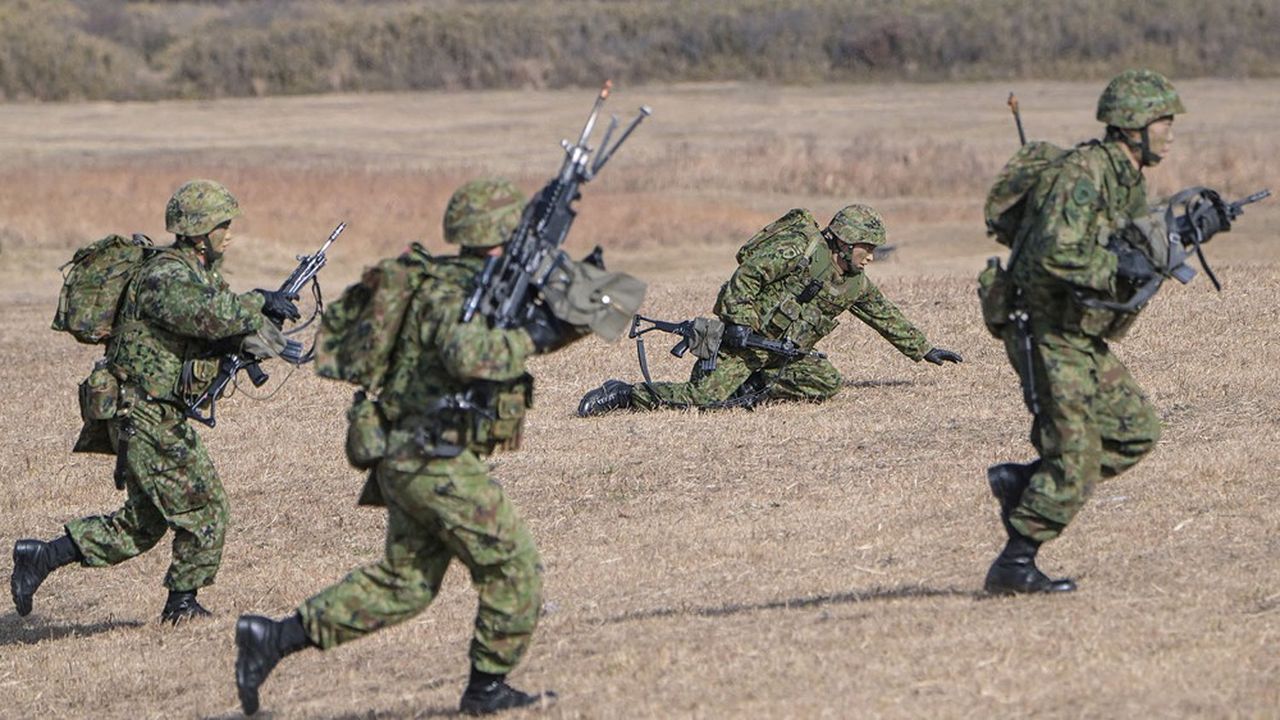
Harassed by China, which is increasing its incursions into its territorial zones, and pressured by its American ally to upgrade its military capabilities, the Japanese Ministry of Defense has just announced that it will request a record budget for the fiscal year starting in April 2025.
The ministry is hoping to secure a budget of 8.5 trillion yen (52.6 billion euros), which would represent a 7% increase over a year. “As we increase our defensive force, we must establish an organization capable of fighting in a new way,” explained the ministry, which will negotiate the exact size of its future credits with the Finance Ministry until December.
A sense of urgency
The conservative government, led until the end of September by Fumio Kishida, should easily validate this budget, which is part of a five-year program to upgrade the country’s military capabilities. Japan has planned to spend 43,000 billion yen (266 billion euros) between 2023 and 2027 to almost double its annual military spending and slowly catch up with the major armies present in Asia.
“There is a strong sense of urgency and crisis regarding the country’s security environment,” said Sayako Sumomo, one of the heads of the international cooperation department at the Ministry of Defense, recently at a seminar. “Russia’s invasion of Ukraine in 2022 was a huge wake-up call,” recalled the expert, who points to Tokyo’s growing anxiety over communist China’s territorial claims throughout the region.
In recent days, Beijing has tested the diplomatic and operational response of Tokyo and its American ally, first by sending one of its spy planes into Japanese airspace, off the Danjo Islands, in Nagasaki Prefecture, and then by sailing one of its exploration vessels off the island of Kuchinoerabu, near Kagoshima.
While Japan has long relied on potential military support from its American ally, which has several bases in the archipelago, it is being encouraged by Washington to strengthen its own capabilities. “In addition, the prospect of a possible Trump election is pushing Japan to do more in terms of defense to avoid being accused of parasitism,” analyzes Narushige Michishita, an expert at the National Graduate Institute for Policy Studies (GRIPS).
The Ministry of Defense explains that it needs new funding to deploy a constellation of satellites, capable of better detecting enemy ships and their possible missiles. It is also preparing to install, on several islands, new batteries of Tomahawk missiles, purchased in the United States, and of “Type 12” anti-ship projectiles, developed locally.
A recruitment problem
A large portion of Japan’s military budget is also to be used to acquire a new generation of more automated equipment, such as surveillance and combat drones, which can be operated by an army whose numbers continue to shrink.
Japan wants to maintain its military strength at 250,000, but because of its demographic collapse, it is no longer able to recruit enough new recruits to compensate for retirements. Last year, the country managed to recruit only 9,960 soldiers out of the 19,600 it had hoped to hire.
Aware of this demographic risk, the ministry has promised that part of its budget will be devoted to increasing salaries, which are known to be very low in the institution, to improving the quality of life on the bases and to better integration and protection of women, following a series of sexual harassment cases.




